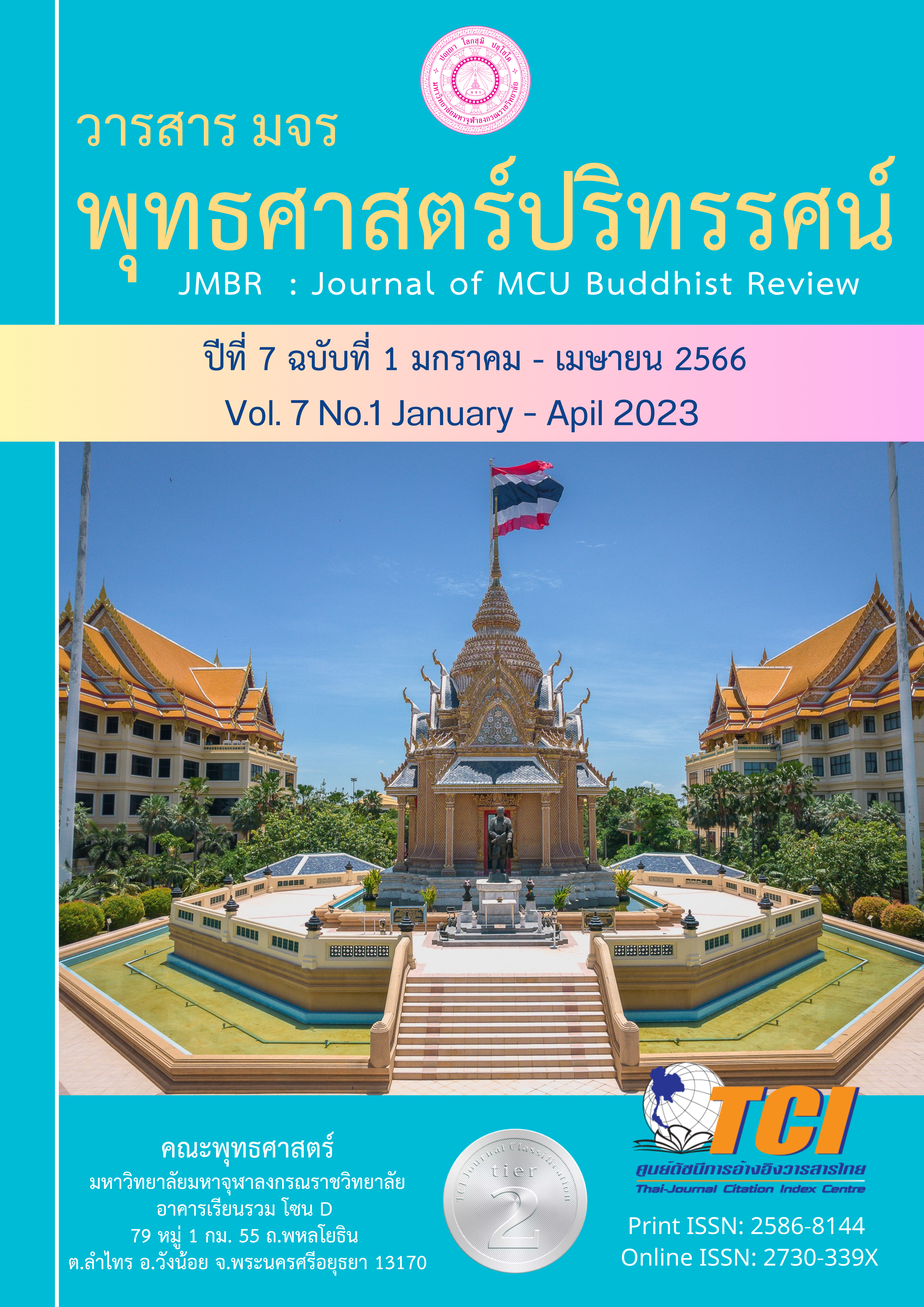ความอ่อนน้อมถ่อมตนที่มีผลต่อความเป็นมงคลและความเจริญรุ่งเรืองของชีวิต
Main Article Content
บทคัดย่อ
มนุษย์เป็นสัตว์สังคมที่ต้องอาศัยอยู่ร่วมกันเป็นหมู่เป็นคณะ มิได้ใช้ชีวิตอยู่เพียงคนเดียวตามลำพัง ต้องทำกิจกรรมร่วมกัน และต้องพึงพาอาศัยซึ่งกันและกันอยู่ตลอดเวลา แต่มนุษย์ในสังคมเหล่านั้นต่างมีชีวิต มีจิตวิญญาณ และมีความรู้สึกนึกคิดที่แตกต่างกัน ด้วยเหตุนี้บางครั้งทำให้สังคมต้องเกิดปัญหา หรือเกิดความสับสนวุ่นวายขึ้น เพราะขาดการเคารพกันในด้านความคิด และการกระทำของกันและกัน ซึ่งพระพุทธศาสนาได้วางรูปแบบการปฏิบัติที่เหมาะสมตามสถานภาพ และบทบาททางสังคมของบุคคลกลุ่มต่างๆ ตามหลักทิศ 6 ซึ่งช่วยให้สังคมมนุษย์มีความสัมพันธ์ที่ดีต่อกัน เป็นการมองเห็นคุณค่าและความสำคัญในการแสดงออกทั้งด้านกาย วาจา และใจ ต่อบุคคลอื่นด้วยความเคารพ ถือเป็นรากฐานสำคัญในการอยู่ร่วมกันของสังคม เพราะเป็นการสร้างความเป็นมงคล และเป็นบ่อเกิดแห่งความสมัครสมานสามัคคี รักใคร่ ปรารถนาดีต่อกัน ทำให้เจริญรุ่งเรืองในชีวิต ด้วยเหตุนี้ จึงจำเป็นอย่างมากที่บุคคลในสังคม จะได้นำหลักธรรมสำคัญในพระพุทธศาสนา ไปประยุกต์ใช้ในสังคมและชีวิตประจำวัน แม้มิใช่เป็นหลักธรรมที่ถือว่าสูงสุดในพระพุทธศาสนา แต่ได้รับความยกย่องว่าเป็นมงคลอันสูงสุด เป็นหนึ่งในมงคลสูตร ดังพระพุทธพจน์ว่า ความอ่อนน้อมถ่อมตน นี้เป็นมงคลอันสูงสุด เป็นหลักธรรมที่ส่งเสริมการพัฒนาจิตใจของมนุษย์ให้สูงขึ้น ด้วยการแสดงออกความอ่อนน้อมถ่อมตนต่อบุคคลอื่น ซึ่งเป็นการกระทำที่บ่งบอกถึงสภาพจิตใจที่เข้มแข็ง ที่สามารถลดทิฐิมานะ ความแข็งกระด้าง ที่เป็นบ่อเกิดของการยกตัวเหนือผู้อื่นลงได้ ด้วยการฝึกฝนอบรมทางสติปัญญาและความประพฤติ เป็นการสร้างความเจริญรุ่งเรืองมั่นคงในชีวิตด้วย
Article Details

อนุญาตภายใต้เงื่อนไข Creative Commons Attribution-NonCommercial-NoDerivatives 4.0 International License.
- บทความที่ได้รับการตีพิมพ์เป็นลิขสิทธิ์ของวารสาร มจร พุทธศาสตร์ปริทรรศน์
- ข้อความใดๆ ที่ปรากฎในบทความที่ได้รับการตีพิมพ์ในวารสาร ถือเป็นความรับผิดชอบของผู้เขียนบทความ และข้อคิดเห็นนั้นไม่ถือว่าเป็นทัศนะและความรับผิดชอบของกองบรรณาธิการวารสาร มจร พุทธศาสตร์ปริทรรศน์
เอกสารอ้างอิง
คณะกรรมการวัฒนธรรมแห่งชาติ. (2544). คู่มือการบริหารและการจัดการโครงการทางวัฒนธรรม. กรุงเทพฯ: องค์การรับส่งสินค้าและพัสดุภัณฑ์.
ธีรพงษ์ มหาวีโร. (2555). แผนพัฒนาเศรษฐกิจและสังคมแห่งชาติ ฉบับที่ 11 (พ.ศ. 2555-2559). กรุงเทพฯ: เดอะบุคส์.
พจนานุกรมฉบับราชบัณฑิตยสถาน พ.ศ. 2554. (2556). เฉลิมพระเกียรติพระบาทสมเด็จพระเจ้าอยู่หัว เนื่อง ในโอกาสพระราชพิธีมหามงคลเฉลิมพระชนมพรรษา 7 รอบ 5 ธันวาคม 2554. กรุงเทพฯ: ศิริวัฒนาอินเตอร์พริ้นท์.
พระคันธสาราภิวงศ์. (2558). มงคลชีวิต 38 ประการ. กรุงเทพฯ: ประยูรสาส์นการพิมพ์.
พระธรรมโกศาจารย์. (2544). มงคลชีวิต. กรุงเทพฯ: ธรรมสภา.
พระภาวนาวิริยคุณ. (2551). ห้าห้องชีวิต เนรมิตนิสัย. กรุงเทพฯ: มปท.
มหาจุฬาลงกรณราชวิทยาลัย. (2539). พระไตรปิฎกภาษาไทย ฉบับมหาจุฬาลงกรณราชวิทยาลัย. กรุงเทพฯ: มหาจุฬาลงกรณราชวิทยาลัย.
มหามกุฏราชวิทยาลัย. (2557). พระไตรปิฎกและอรรถกถา ฉบับมหามกุฏราชวิทยาลัย ในพระบรมราชูปถัมภ์ชุด 91. (พิมพ์ครั้งที่ 8). กรุงเทพฯ: มหามกุฏราชวิทยาลัย.
มหามกุฏราชวิทยาลัย. (2556). พระไตรปิฎกบาลี ฉบับสยามรัฐ. (พิมพ์ครั้งที่ 7). นครปฐม: มหามกุฏราช วิทยาลัย.
สมเด็จพระสังฆราชอุฏฐายี มหาเถร (จวน อุฏฺฐายี). (2538). มงคลในพระพุทธศาสนา. กรุงเทพฯ: กิตติวรรณ.


